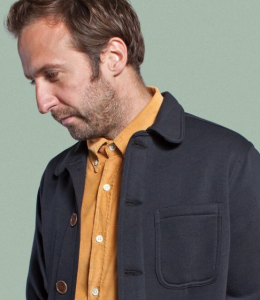FAR AFIELD is a British brand. We’ve stocked their vibrant prints since forever, and are currently looking forward to their AW21 range of jackets, cardigans and fisherman-style smocks.
We quizzed co-founder Chris on his and his brother’s sustainability strategies.

What are you proudest about regarding the sustainability measures you employ?
I am most proud of our desire as a brand to constantly do and be better. We have set various sustainability targets since our inception in 2015 and are constantly evolving in this department.
What are your goals?
Our latest goal is to be 100% plastic free as a company by the end of 2021, and we are very near to achieving that. The only issues we are facing is sourcing suitable packaging for our larger products like winter jackets etc; finding a non-plastic alternative for this is proving very difficult.
A big development is that we are also now looking into “QR traceability”. This is where the customer can scan a barcode on the garment swing-tag and track how and where the garment was made. We are at the early stages with this but by early 2022 we plan to start making progress.
Tell us about your recent successes.
Some of the more major measures that we have employed so far include:
Switching all our cotton to either BCI or Organic (or very occasionally, using upcycled).
Phasing out all plastic in the company; this includes our mailer bags for online orders and all garment and packaging trims etc.
Intensely researching (and now using) eco alternative fabrics on some product ranges; like recycled wools / recycled polyester (Repreve)…
Ensuring all yarns on our knitwear are non-mulesed (mulesed is when skin is cut from animals to avoid disease).
How fearful are you about current action being taken to combat climate change?
Obviously, it was much more difficult to be positive when you see world leaders (Donald Trump et al) peddling their anti-climate change agenda and taking backwards steps. However, I think common sense and science has prevailed, and even some of the most hardened critics are starting to change their perspective on climate change.
We must continue to think and act positively. As we all know, a lot of the damage has already been done, but if we all do our bit, however small, it can only be a good thing.
Thankfully, the global youth of today are much more educated on climate and seem very willing to stand and fight. We find a lot of our younger customers are always asking important questions and demanding to know “where” “who” “what” about each garment they buy.
What would be your “green” advice to aspiring clothing entrepreneurs starting out?
Being sustainable is not easy, and it is not cheap.
Sustainable alternatives generally cost more than less sustainable options, and we find that the minimum order quantities for sustainable options (on say … bags, trims, fabrics etc) are very high. Suppliers do not make it easy to buy sustainable without buying in huge bulk – not ideal, for small indie-brands like ours.
You also need to be self-critical. Try to be open to criticism and feedback from your customers as this will help you grow and develop new ideas and initiatives. Thanks to feedback from our customers, we have been able to constantly develop our sustainability programs and initiatives.
And being ‘Sustainable’ is certainly not a part-time job. You need to be 100% committed and keep abreast of new developments and ideas.







